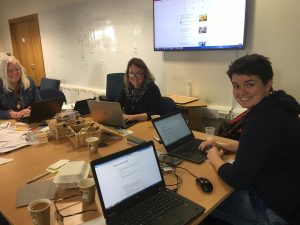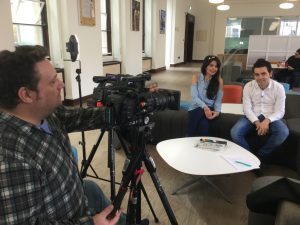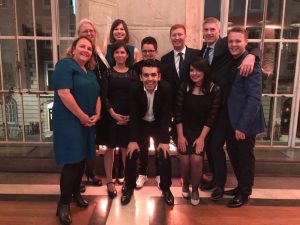“What we didn’t have back then was a way to reach people in refugee contexts as it’s unlikely they’d know to look for our learning content”
This Refugee Week, Chloe Shaw, partnerships strategy manager at Cambridge Assessment English shares how a suggestion from a colleague has turned into a flourishing staff-led initiative focused on helping give refugees and asylum seekers access to education.
Back in 2016, we were in the throes of an organisational change program and a key part of that was around hearing from staff about what matters to them and what kind of organisation they wanted to be working for. It was also a time when the global refugee crisis was rarely out of the media.
One of our colleagues, Sarah Rogerson, put forward the idea that, as a global education organisation, we could be doing more to help forced migrants. Very quickly a small team formed around this idea and began to plan.

Given what we do is help people learn English, we already offer a lot of free learning materials and different kinds of teacher support. What we didn’t have back then was a way to reach people in refugee contexts as it’s unlikely they’d know to look for our learning content or be studying in a typical classroom situation.
So our starting point was to talk to lots of people – our existing partners, NGOs, charities and grassroots organisations – to build up our knowledge of the challenges learners face in these contexts. We also went to events, such as the British Council Language for Resilience conference and a Techfugees Hackathon, to learn more and network. We quickly found that we could play a role in bringing people together.
So not just us partnering with other organisations to make things happen but also facilitating conversations and bringing people together who might not otherwise meet. This led us to organise our own conference with Techfugees so we could get refugees, teachers, educators, NGO, charities and investors all together in the same room to work on some specific language education challenges.
One of the most exciting solutions to come out of the event was our free online courses.

We announced the first in April 2017. ‘Aim higher’ helps refugees and asylum seekers access higher education in the UK. SOAS University of London, UCAS, University of Nottingham, British Council, The Student Room, Article 26, Techfugees and Star Network all helped to make this course a reality and over 3,000 people registered for the first two runs of the course.
We’re also helping people prove their skills by offering exam bursaries for several of our English exams, including C1 Advanced and OET (Occupational English Test). Through our IT department, we now clean up and donate our old laptops and mobile phones and donate them to refugee charities in places like Lebanon, France and Greece. Staff in our Assessment department have also been teaching refugees online and face to face.
We were delighted to be shortlisted for a PIEoneer Award last year for all our work in this area which has spurred us on to achieve even more.

This Refugee Week, we’re putting a call out to people who might like to help us launch an online ‘Language for employability’ course. We know from speaking to teachers at IATEFL this year that there’s already a lot of interest.
So, if you think you can help, please do get in touch. In fact, we’d love to hear from you if you have other ideas of how we could collaborate to help refugees access education – you can reach us at partnerships@cambridgeenglish.org
Refugee week is a program of arts, cultural and educational event and activities that celebrate the contribution of refugees and promotes a better understanding of why people seek sanctuary.


